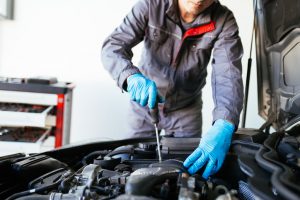Auto mechanics are separated by skill level and specializations as not all are the same. Some mechanics have a more advanced skillset when it comes to working on a specific brand of vehicles. Those individuals are known as manufacturer specific certified mechanics. A manufacturer specific certification is a type of specialization that leads to higher salaries, job stability and a wider selection of career possibilities. Becoming manufacturer certified is a detailed process that can elevate the status of a mechanic in the automotive repair industry. It is both rewarding and advantageous from a professional perspective.
Featured Program:
Penn Foster Career School:
• Online Auto Repair Technician Career Diploma Program
Prerequisite Auto Mechanic Education

Mechanic conducting overview
In order to qualify for admission to a manufacturer specific training program, mechanics need to have some pre-existing automotive training. That is generally acquired through the completion of an automotive technician Associate Degree or Career Training Program. This type of training provides mechanics with an understanding of the general concepts, techniques and procedures involved with automotive repair. From there, mechanics learn an additional skillset that is specific to a certain manufacturer.
The minimum education level to begin training in automotive repair is generally a high school diploma or GED equivalency. Each auto repair program will specify its criteria for admission. Manufacturer specific programs also have set criteria when admitting students to their respective training programs. Work experience is also part of the prerequisites to be admitted into the majority of higher-level automotive repair training programs.
Manufacturer Specific Certification Training
To become manufacturer certified is to be trained and skilled to work on a specific brand of vehicles. Mechanics can choose to become certified in different brands, such as Ford, Honda, Volkswagen, Volvo, GM and many more. This distinction is also referred to as factory certified. It means that mechanics have an in-depth knowledge of all the inner workings of vehicles made by that manufacturer.
One of the more common approaches to certifying mechanics is enrolling them in a company training institute for a specific amount of time. Certain automotive dealerships may do this when one of their mechanics shows a certain amount of promise and skill. The length of this training differs, according to the manufacturer. Some manufacturers have large facilities used as training centers.
There are other dealerships who will only look to hire mechanics that are certified to work on a specific brand of vehicles. This means that auto mechanics need to acquire a specific kind of training to be considered for employment. There are a number of automotive training institutes that offer manufacturer specific training. These institutes have detailed curriculums that equip mechanics with the overall skillset needed to work on all the vehicles produced by a certain manufacturer. The training includes the following approaches:
Classroom Instruction
Web-based modules
Repair shop training
Coordinated work internships
Practical application
Different manufacturers have different protocol when it comes to training mechanics to become certified. Some programs are longer in duration while others offer entry level training. These entry-level programs provide two-year training for aspiring mechanics. When enrolling in one of these programs, mechanics are trained to work on all vehicles, although there is a concentration on ones produced by that manufacturer. The completion of the program does not result in manufacturer specific certification, but will provide mechanics with the skills needed for an entry level position and they will also have an early familiarization with those specific vehicles. They can begin working for that company and then gain the necessary experience to become manufacturer certified.
This kind of automotive training means that students take a hands-on approach to working on the latest technology and vehicle features. That means manufacturer certified mechanics are always able to work on vehicles with the most cutting-edge technology and newest innovations. That involves the following focus areas:
Testing procedures
Diagnostic methods
Electrical systems
Diesel engines
ASE Training and Manufacturer Specific Training differences

Auto mechanic repairing car.
ASE certifications go a long way in the auto repair industry as it is a way of showing advanced skill levels. ASE certifications allow mechanics to assert themselves as experts in particular areas of auto repair. However, ASE certifications should not be confused with manufacturer specific certifications. An ASE certification concentrates more on the core principles of automotive repair while a manufacturer specific certification focuses more on the intricacies of individual vehicles.
Those who have acquired multiple ASE certifications may be very skilled, although manufacturer specific certifications represent a different kind of skill. Even the most accomplished ASE certified mechanics do not have the depth of knowledge that manufacturer specific certified mechanics hold.
Eligibility Requirements for Manufacturer Specific Training
Various manufacturers have different experience requirements when it comes to bringing on manufacturer certified mechanics. Companies invest sizable amounts of money in this type of training, so there is a need to be certain that whoever undergoes that training is going to be around for the long term. Many dealerships will make their own mechanics eligible for certification once they have established themselves within that company.
Training institutes also set forth their own requirements for students looking to gain admission to a manufacturer specific training program. Here is a look at some of the common eligibility requirements used by those institutes.
Master Manufacturer Specific Mechanic Certification
For those who are looking to achieve the highest possible status as a manufacturer specific mechanic, there is the option of becoming a master mechanic through a specific manufacturer. However, it is a process that can span a number of years. Most manufacturers will require their mechanics to complete a large number of courses before earning that distinction. Even after they have become certified, there are more courses to complete before earning master status.
There are typically core classes required before completing more innovative courses, such as new technology classes. The continual upgrade in sophistication in engine systems requires mechanics to be updated on all the latest changes. Continual tests monitor a mechanic’s progress as passing scores are needed on a variety of exams. Many car companies strictly monitor the actual tests as some mechanics are required to take exams right in front of corporate employees. This is done to ensure there is no cheating involved.
Questions on these tests are very detailed and many of the answers rely on actual work experience. For example, mechanics may be asked the wait time before starting repair on a certain year make and model airbag system. The level of difficulty is generally very high, which is a reason why there are a limited number of master manufacturer certified mechanics.
Ongoing Training for Manufacturer Certified Mechanics
Once a mechanic becomes manufacturer certified, he/she becomes a member of an elite group. But that does not mean their training is finished. A number of manufacturers will often send their certified mechanics to their main facility for additional training. That means mechanics will be able to gain valuable new insight on the latest features. Companies are very selective with who they train in this capacity. Training is an investment in these mechanics and shows them to be of high value to the company.
Some automobile companies even recruit mechanics to be part of their training program. Getting young mechanics to commit to a dealership early in their careers presents the opportunity for a long-term commitment where job stability is solidified for years to come. Many car companies are also involved in AYES (Automotive Youth Educational Systems), which helps aspiring mechanics start out their training. This can be a pathway to a long-lived career.
Benefits of Being a Manufacturer Certified Mechanic
Once a mechanic becomes manufacturer certified, a number of possibilities will begin to open up. There are a lot of ASE certified mechanics, but there are fewer manufacturer certified mechanics. This means that manufacturer certified mechanics are in higher demand and that can translate into higher pay rates.
Many vehicle owners are very particular about where they take their cars and trucks for automotive service. When buying a new vehicle, buyers place a certain amount of trust and confidence in a dealership. So, when it comes time to make some type of repair, they rely on that trust by taking their vehicle back to that dealership. And it is the responsibility of the dealership to ensure that the mechanics working on those vehicles are more skilled than other mechanics. That also allows dealerships to charge more for service than local repair shops, which means they can pay their mechanics higher salaries.
Manufacturer certified mechanics are also able to learn about state-of the art technology as soon as it becomes available. They receive a jump on the latest innovations and technological advances. Should a manufacturer specific mechanic choose to leave his/her current place of employment, they will quickly see their value in the automotive repair job market. This distinction will allow mechanics to pick and choose where they want to work as this specialty means they do not have to settle for a position that they do not really want.
There is also a benefit to manufacturers. Certified mechanics produce a high level of workmanship that adds to the prestige of a specific manufacturer. It is a way of elevating the overall credibility of a particular manufacturer and heightening their brand in the automotive and driver community.
